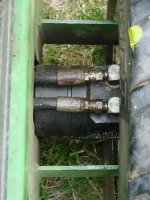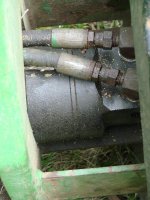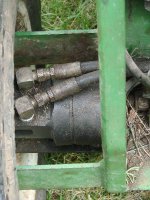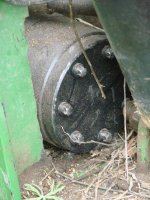"Lugging" an engine means to load it down to the point that the engine slows down or struggles to meet the demands you're placing on it -- it can't maintain its RPM against that load. Typically with an air-cooled engine, there's two steps that occur when you place a large load on an engine (at virtually any RPM).
First, most small engines have governors on them that limit the top end RPM but also interact with the carb automatically to try to maintain the set speeds. If a larger than intended load is placed on the engine it will kick in the governor, increasing the flow of gas/air to the engine trying to maintain the RPM you have set with the throttle. If that isn't sufficient, the engine will then slow down because it can't produce the demanded power to meet the load. Each of those steps typically will sound a little different to an experienced ear. The governor kicking in will often be more of a "deeper sounding roar." The engine slowing down is also a low, deeper sound, and will sometimes result in a "struggling or chugging" sound if you don't remove the load being placed on it, or give it more throttle (if you can). You can lug an engine until it completely dies -- NOT a good thing.
Running on governor will cause an engine to run hotter if it occurs for an extended period of time. Though it technically isn't the same at all -- imagine an automatic transmission in your car downshifting to "passing gear" and then trying to run there for a long time to maintain the same speed. The car's engine can also overheat in that circumstance. In both cases (small engine or car engine) the engine is creating more heat working than the cooling system at that speed/RPM can handle.
Once you get used to the sound of the engine at different throttle settings, you can hear these changes occurring. With the PT you'll often also hear hydraulic noises as the hydraulic motors strain to meet the demands...
In summary, it's never OK to overload the engine for
extended periods, regardless of throttle setting. Small air-cooled engines are perhaps more vulnerable than water-cooled engines, but it's not good for the longevity of either one...
EDIT: Just for grins, I googled "lugging engine" and found this description from Tom & Ray, in regards to a car engine -- in this case, trying to take off at too low RPM or in too high a gear...
Tom And Ray Explain 'Lugging the Engine' | HamptonRoads.com | PilotOnline.com







